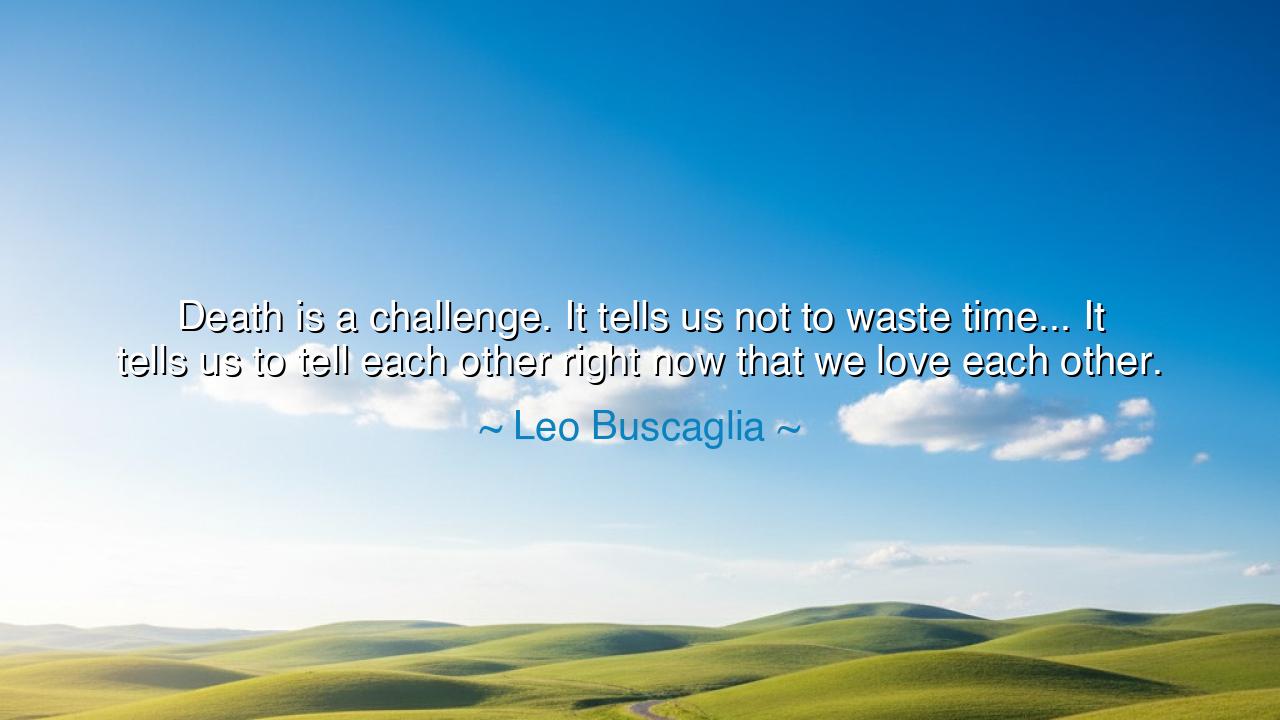
Death is a challenge. It tells us not to waste time... It tells
Death is a challenge. It tells us not to waste time... It tells us to tell each other right now that we love each other.






Leo Buscaglia once said: “Death is a challenge. It tells us not to waste time… It tells us to tell each other right now that we love each other.” These words, tender and radiant with truth, are a song to the living — a reminder that mortality, far from being our enemy, is the teacher that awakens us to life’s deepest meaning. In his gentle yet passionate way, Buscaglia — known to many as “Dr. Love” — transforms the fear of death into a call to love. He does not speak of death as an end, but as a mirror, reflecting back to us how precious and fleeting every moment truly is. Through this quote, he urges us to live fully, to love openly, and to waste not a heartbeat in silence or regret.
The origin of this thought flows from Buscaglia’s lifelong devotion to the study of love and human connection. As a professor at the University of Southern California, he once taught a course simply called “Love,” born from his desire to understand why people fear vulnerability and neglect affection until it is too late. He often recounted that it was the sudden death of one of his students that sparked his transformation — that moment when he realized how swiftly life can vanish, leaving words unsaid and gestures undone. From that pain blossomed a philosophy: that love must be expressed now, for tomorrow is never promised. It was not death that frightened him — it was the thought of leaving love unspoken. Thus, in this quote, he turns mortality into a sacred messenger, urging us to live while we still can.
When Buscaglia says “Death is a challenge,” he means that it confronts us with our own impermanence, stripping away illusion and vanity. The ancients, too, understood this. The Stoics practiced memento mori — the meditation on death — not to breed despair, but to sharpen gratitude. For them, death was the great equalizer, the silent voice whispering, “Remember, you will not live forever.” This truth, far from darkening their hearts, illuminated their days. It reminded them that time is not a guarantee but a gift — that each sunrise is a sacred invitation to love, to forgive, to create. Buscaglia echoes this ancient wisdom in modern language: death teaches us urgency, but love gives that urgency meaning.
History, too, bears witness to this truth. Consider the story of Anne Frank, who, even in the shadow of death, wrote in her diary, “In spite of everything, I still believe that people are really good at heart.” Hers was a life cut short, yet her words, born of both suffering and hope, continue to teach the world how to live. She, like Buscaglia, saw the beauty in fragility. Death stood at her door, but she answered with compassion, not despair. In her courage, we see the same message: that love is the defiance of death, the fire that continues to burn when all else fades. Buscaglia’s challenge is no different — to look at mortality not with fear, but with gratitude, and to respond with acts of kindness and connection.
There is a profound wisdom in recognizing that death gives life its meaning. If we were immortal, we might drift endlessly through days without urgency or passion. But because our time is finite, every moment gains value. Every conversation, every touch, every expression of affection becomes sacred. Death, then, is not the enemy of life but its measure — it forces us to ask: Have I loved enough? Have I spoken what is in my heart? Have I lived awake? The greatest tragedy, Buscaglia warns, is not that life ends, but that so many of us never truly begin to live before it does.
And so, when he says, “Death tells us to tell each other right now that we love each other,” it is a commandment of the soul. Love delayed is love denied. Too often, people wait for the perfect time to express their feelings — for comfort, for safety, for tomorrow — but tomorrow is not guaranteed. The ancients would have understood this as the wisdom of carpe diem — to seize the day, to speak what must be spoken before silence takes us. To love now is to conquer time itself. For love, once given, never dies; it becomes eternal through the act of its giving.
Let this, then, be the lesson: do not waste time withholding love. Say the words. Make the call. Forgive the wound. Share the smile. The measure of life is not its length but its depth — the number of moments in which we choose connection over indifference, compassion over pride. Each day, death reminds us that the sands are falling, that every sunrise may be our last. But Buscaglia’s wisdom transforms that truth into courage: to live vividly, to love fiercely, and to never let fear silence the heart.
For in the end, death is not the thief of life — forgetting to love is. So while you still draw breath, look into the faces of those around you and say the words that matter most. Tell them you love them. Tell them now. For that, above all else, is the triumph over death that Buscaglia so beautifully teaches — the immortality born not of years, but of love that outlives the body and dwells forever in the hearts of those it touched.






AAdministratorAdministrator
Welcome, honored guests. Please leave a comment, we will respond soon